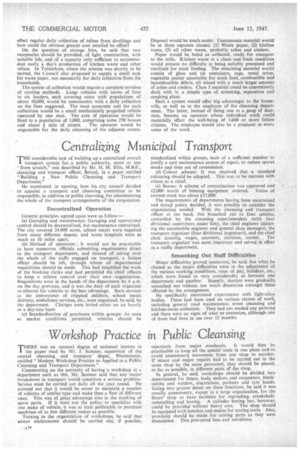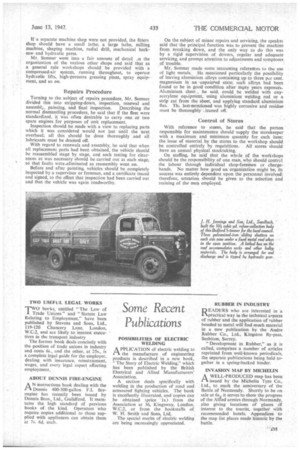Workshop Practice in Public Cleansing
Page 44

Page 45

If you've noticed an error in this article please click here to report it so we can fix it.
THERE was an unusual degree of technical interest in 1 the paper read by Mr. J Sumner, supervisor of the central cleansing and transport depot, Westminster, entitled "Modem Workshop Practice as Applied to a Public Cleansing and Transport Department."
Commenting on the necessity of having a workshop in a department such as this, Mr. Sumner said that any major breakdown in transport would constitute a serious problem. Service must be carried out daily all the year round. He pointed out that it would be easier to maintain a number of vehicles of similar type and make than a fleet of different ones. This was of great advantage also in the stocking of spare parts. If it were not the policy, to specialize with one make of vehicle, it was at least preferable to purchase machines of as few different makes as possible.
Turning to the organization of workshops, he said that minor maintenance should be carried out, if possible.
separately from major overhauls. It would then be practicable to keep all the special tools in one place and to avoid unnecessary movement from one shop to another. If minor and major repairs had to be carried out in the same shop by the same personnel, they should he placed, as far as possible, in different parts of the shop.
In general, he said, workshops should be divided into departments for fitters, body makers and carpenters, blacksmiths and welders, electricians, painters and tyre hands. Going into greater -detail on these functions, he said it was usually unnecessary, except in a large organization, for the fitters' shop to have facilities for regrinding, crankshaftremetalling and boring. A cylinder boring bar, however, could be provided without heavy cost. The shop Should be equipped with benches and means for storing tools. Also, provision should be made for storing parts as they were dismantled. This prevented loss and untidiness.
If a separate machine shop were not provided, the fitters shop should have a small lathe, a large lathe, milling machine, shaping machine, radial drill, mechanical hacksaw and hydraulic press.
Mr. Sumner went into a fair amount of detail sn the organization of the various other shops and said that as a general rule workshops should be provided with a compressed-air system, running throughout, to operate hydraulic lifts, high-pressure greasing plant, spray equipment, and so on.
Repairs Procedure
Turning to the subject of repairs procedure, Mr. Sumner divided this into stripping-down, inspection, renewal and
assembls, painting, and final inspection. Describing the• normal dismantling procedure, he said that if the fleet were standardized, it was often desirable to carry one or two spare engines for purposes of unit replacements
Inspection should be made with a view to replacing parts which it was considered would not last until the next overhaul; all this should be done thoroughly and all lubricants must be drained off.
With regard to renewals and assembly, he said that when all replacement parts had been obtained, the vehicle should be reassembled stage by stage, and such testing for clearances as was necessary should be carried out at each stage, so that faults were .eliminated as reassembly went on.
Before and after painting, vehicles should be completely inspected by a supervisor or foreman, and a certificate issued and signed, to the effect that inspection had been carried out and that the vehicle was again roadworthy. On the subject of minor repairs and servicing, the speakes said that the principal function was to prevent the machine from breaking down, and the only way to do this was by a rigid supervision of drivers, regular and adequate servicing, and prompt attention to adjustments and symptoms of trouble.
Mr. Sumner made some interesting referentes to the use of light metals. He mentioned particularly the possibility of leaving aluminium alloys containing up to three per cent. magnesium in an -unpainted state; such alloys had been found to be in good condition after many years exposure.. Aluminium sheet he said, could be welded with oxyacetylene equipment, using aluminium welding rod or 11 strip cut from the sheet, and applying standard aluminium flux, Ths last-mentioned was highly corrosive and residue must be thoroughly dotted off.
Control of Stores
With reference to stores, he said that the person responsible for maintenance should supply the storekeeper with a maximum and minimum quantity for each item; the issue of material by the stores to the workshop should be controlled entirely by requisitions. All stores should have an annual physical stocktaking.
On staffing, he said that the whole of the workshops should be the responsibility of one man, who should control_ the labour through individual shop-foremen or chargehands. No matter how good an organization might be, its success was entirely dependent upon the personnel involved; therefore, attention should be given to the selection and training of the men employed.












































































